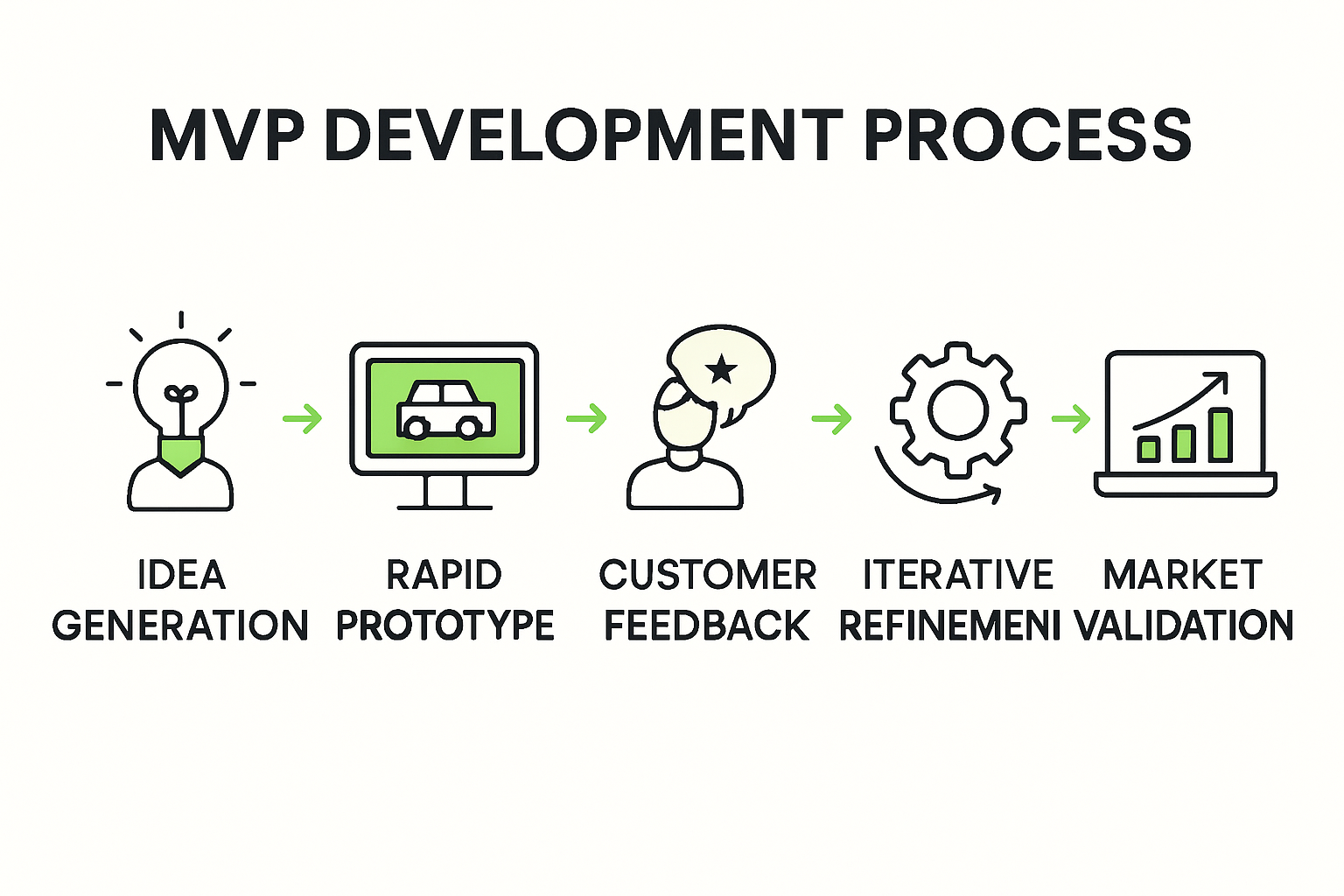
10 Essential Habits of Successful Entrepreneurs Explained
Everyone talks about working hard as the secret behind every successful entrepreneur. Turns out the real game is in consistent daily habits, not nonstop hustle. Studies show that structured routines can significantly boost productivity and mental performance for entrepreneurs. You might think it’s all about burning the midnight oil but the real growth happens with small, repeatable actions, not grand gestures. Ready to see what habits set the winners apart?
Table of Contents
- Daily Routines That Build Entrepreneurial Mindsets
- Morning Ritual Architecture
- Habit Formation And Skill Development
- Evening Reset And Strategic Planning
- How Successful Entrepreneurs Overcome Challenges
- Psychological Resilience And Self-Efficacy
- Strategic Problem-Solving Approaches
- Mentorship And External Support Systems
- Effective Networking And Learning Habits
- Strategic Relationship Building
- Continuous Learning Frameworks
- Knowledge Application And Experimentation
- Turning Ideas Into Actionable Business Steps
- Developing A Minimal Viable Concept
- Strategic Value Proposition Design
- Technology And Adaptive Business Modeling
Quick Summary
Daily Routines That Build Entrepreneurial Mindsets
Successful entrepreneurs understand that greatness isn’t about sporadic bursts of inspiration but consistent daily practices that shape mindset and performance. Your morning routine isn’t just a checklist - it’s the blueprint for your entrepreneurial success.
Morning Ritual Architecture
The first few hours of your day are mission-critical. Research from the World Economic Forum reveals that structured daily routines can significantly enhance cognitive functions and boost overall productivity. Successful entrepreneurs design their mornings with intention, not accident.
This means creating a predictable sequence that primes your brain for peak performance. Wake up at the same time. Hydrate immediately. Avoid checking emails or social media in the first hour. Instead, engage in activities that center your mind and energize your body - meditation, light exercise, journaling, or reading material that expands your entrepreneurial thinking.
Your morning isn’t about perfection but purposeful progression. Small consistent actions compound into extraordinary results.
Habit Formation and Skill Development
University of Michigan’s Center for Entrepreneurship highlights that successful entrepreneurs share specific habit patterns. These aren’t mystical talents but learnable skills practiced consistently.
Key habits include:
- Learning Commitment: Dedicating 30-60 minutes daily to skill acquisition
- Network Expansion: Connecting with one new professional contact weekly
- Reflective Practice: Journaling about challenges, learnings, and strategic insights
- Physical Wellness: Regular exercise and mindful nutrition
To help clarify the essential daily habits that support entrepreneurial growth, the table below summarizes four key routines discussed in the article, along with their primary focus and practical implementation.
Evening Reset and Strategic Planning
Entrepreneurial mindset isn’t just about morning hustle. Your evening routine is equally crucial for maintaining momentum and mental clarity. Spend 15-20 minutes reviewing your day, identifying wins, analyzing challenges, and preparing your strategy for tomorrow.
This isn’t about rigid scheduling but creating a flexible framework that adapts to your unique entrepreneurial journey. Reflect on what worked, what didn’t, and how you can optimize your approach. Your evening review becomes the strategic groundwork for tomorrow’s potential breakthroughs.

Remember: Routines are your personal operating system. Design them deliberately, execute them consistently, and watch how they transform your entrepreneurial potential.
How Successful Entrepreneurs Overcome Challenges
Entrepreneurship is not a smooth journey of guaranteed success but a complex path filled with unexpected obstacles and potential setbacks. Understanding how successful entrepreneurs navigate these challenges is crucial for aspiring business leaders.
Psychological Resilience and Self-Efficacy
Research from the National Center for Biotechnology Information reveals that entrepreneurs’ ability to overcome challenges fundamentally depends on their self-efficacy and emotional regulation skills. Self-efficacy represents the confidence in one’s ability to execute tasks and manage difficult situations, which becomes a critical psychological asset in entrepreneurial landscapes.
Successful entrepreneurs don’t view challenges as insurmountable barriers but as opportunities for growth and learning. They develop mental frameworks that transform obstacles into stepping stones. This involves cultivating a growth mindset where failures are seen as valuable feedback rather than permanent defeats.
Key psychological strategies include:
- Reframing Setbacks: Viewing challenges as learning experiences
- Emotional Regulation: Managing stress and maintaining composure
- Persistent Mindset: Maintaining motivation despite temporary setbacks
The table below summarizes different psychological strategies that entrepreneurs use to overcome challenges, outlining both their main focus and the way each approach is utilized in daily business life.
Strategic Problem-Solving Approaches
Researchers examining entrepreneurial personality traits discovered that successful entrepreneurs possess unique characteristics that enable them to navigate complex business environments. These individuals demonstrate higher levels of openness to adventure and lower levels of conventional modesty, allowing them to approach problems with creativity and bold strategies.
Effective problem-solving for entrepreneurs involves:
- Systematic analysis of challenges
- Breaking complex problems into manageable components
- Developing multiple potential solutions
- Implementing rapid experimentation and iteration
The goal is not to eliminate all risks but to develop adaptive strategies that allow quick pivoting and continuous learning.
Mentorship and External Support Systems
Arizona State University’s Edson Entrepreneurship + Innovation Institute emphasizes the critical role of mentorship in overcoming entrepreneurial challenges. External support systems provide crucial insights, perspective, and guidance that can help entrepreneurs navigate complex business landscapes.
Successful entrepreneurs actively seek mentorship and build robust networks that offer:
- Strategic advice from experienced professionals
- Emotional support during challenging periods
- Access to broader professional networks
- Opportunities for knowledge transfer
Building these support systems is not about dependency but creating a collaborative ecosystem that fosters growth and provides alternative perspectives when facing challenging situations.
Remember, overcoming challenges is not about avoiding difficulties but developing the resilience, creativity, and support networks that transform obstacles into opportunities for innovation and personal growth.
Effective Networking and Learning Habits
Networking and continuous learning are not optional extras for entrepreneurs - they are fundamental survival skills in a rapidly evolving business ecosystem. The most successful entrepreneurs understand that their growth depends on strategic connections and perpetual knowledge acquisition.
Strategic Relationship Building
Research from the International Journal of Environmental Research and Public Health reveals that entrepreneurs who proactively engage in peer networking demonstrate significantly higher problem-solving capabilities and business adaptability.
Effective networking isn’t about collecting business cards or superficial LinkedIn connections. It’s about cultivating meaningful professional relationships that provide genuine value. This means approaching networking with a mindset of contribution rather than mere extraction.
Key networking strategies include:
- Intentional Connections: Seek quality over quantity in professional relationships
- Mutual Value Exchange: Understand what you can offer, not just what you can receive
- Diverse Network Development: Connect with professionals across different industries and expertise levels
Continuous Learning Frameworks
Successful entrepreneurs treat learning as a non-negotiable daily practice. They recognize that the half-life of professional skills is shrinking rapidly, making continuous education crucial for staying competitive.
This doesn’t mean enrolling in endless courses or accumulating certifications. Instead, it’s about developing a personal learning ecosystem that includes:
- Reading diverse materials beyond your immediate field
- Participating in industry webinars and conferences
- Engaging with online learning platforms
- Following thought leaders and innovative practitioners
The goal is to create a dynamic, adaptable learning approach that keeps you intellectually nimble and strategically informed.
Knowledge Application and Experimentation
Learning without implementation is merely entertainment. Successful entrepreneurs distinguish themselves by rapidly converting new insights into actionable strategies. This requires a structured approach to knowledge absorption and practical application.
Develop a personal knowledge management system that allows you to:
- Capture insights from various sources
- Categorize and tag learning materials
- Create experimental frameworks to test new concepts
- Reflect on and document lessons learned from each experiment
Think of your learning process like a scientific experiment - hypothesis, test, analyze, iterate. Each piece of knowledge becomes a potential tool for innovation and problem-solving.
Remember: Networking and learning are not destinations but continuous journeys. The most successful entrepreneurs remain perpetually curious, humble, and open to unexpected insights that can transform their understanding and approach to business.
Turning Ideas Into Actionable Business Steps
Transforming a brilliant idea into a viable business isn’t magic - it’s a systematic process of strategic planning, validation, and iterative development. Successful entrepreneurs understand that ideas are merely starting points. The real magic happens in converting conceptual sparks into concrete, executable strategies.
Developing a Minimal Viable Concept
Research analyzing software startup strategies reveals that developing a Minimum Viable Product (MVP) is crucial for transforming abstract ideas into tangible business steps. An MVP allows entrepreneurs to test core hypotheses with minimal resources, providing critical market feedback without massive upfront investment.

This approach involves:
- Rapid Prototype Creation: Build the simplest version of your core value proposition
- Customer Validation: Gather immediate user feedback
- Iterative Refinement: Continuously adapt based on real-world insights
The goal isn’t perfection but learning. Your first version will never be your final version. Embrace imperfection as a pathway to innovation.
Strategic Value Proposition Design
Research from scientific entrepreneurship studies emphasizes the importance of clearly defining your value proposition. This means understanding exactly what problem you’re solving and for whom.
Effective value proposition development requires:
- Identifying specific customer pain points
- Articulating your unique solution
- Demonstrating measurable benefits
- Differentiating from existing market solutions
Think of your value proposition as a strategic compass. It guides product development, marketing strategies, and overall business direction.
Technology and Adaptive Business Modeling
Emerging research in AI-driven entrepreneurship highlights the transformative potential of integrating adaptive systems into business planning. Modern entrepreneurs don’t just create static business plans - they develop flexible frameworks that can quickly respond to market changes.
Key adaptive business modeling strategies include:
- Regular market environment scanning
- Scenario planning and contingency development
- Leveraging technology for real-time insights
- Building organizational flexibility
Successful entrepreneurs treat their business model like a living organism - constantly evolving, learning, and adjusting to new environmental conditions.
Remember: Turning ideas into actionable business steps is part science, part art. It requires disciplined thinking, relentless curiosity, and the courage to experiment. Your first step is always more important than your perfect plan.
Frequently Asked Questions
What daily habits do successful entrepreneurs practice?
Successful entrepreneurs focus on structured daily routines, including morning rituals, continuous learning, strategic networking, and reflective practices. These habits enhance productivity and foster a growth mindset.
How can entrepreneurs develop psychological resilience?
Entrepreneurs can cultivate psychological resilience by reframing setbacks as learning opportunities, managing their emotions during stress, and maintaining a persistent mindset in the face of challenges.
Why is networking important for entrepreneurs?
Networking is crucial for entrepreneurs as it leads to meaningful professional relationships, provides access to valuable advice and support, and fosters opportunities for collaboration and knowledge exchange.
What is a Minimum Viable Product (MVP) and why is it important?
A Minimum Viable Product (MVP) is the simplest version of a product that allows entrepreneurs to validate their business idea with minimal resources. Testing an MVP helps gather crucial market feedback and guides further development.
Turn Your Entrepreneurial Habits Into Real-World Business Success
Building consistent habits is only half the battle for entrepreneurs. You know that moments of inspiration fade without clear direction or actionable steps. The real struggle comes when you try to translate routines like reflective journaling, MVP development, or networking into meaningful business progress. If you have ever felt lost after reading about the “essential habits” of successful founders, you are not alone. Many dreamers stall out, unsure how to turn powerful routines into a structured business path.
Here is where siift becomes your personal guide. Our intuitive AI is designed to help founders like you apply proven habits and strategies every single day. Instead of forcing yourself through trial and error, siift gives you step-by-step guidance and personalized feedback, helping you build on your strengths, form winning routines, and move your ideas forward. Visit siift’s founder platform now to access tailored insights and start taking action. Your path to launching smarter starts with your next habit—make it count today.
Recommended

see where you really stand





.svg)
.svg.png)



.svg)

